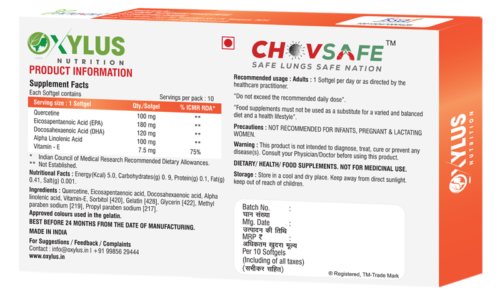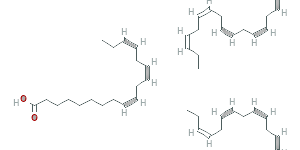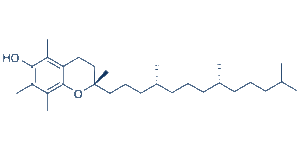
CHOVSAFE™ protects the lungs and heart through a novel blend of Quercetine,
Omega Fatty acids & Vitamin E, by rejuvenating lung tissue and heart function. CHOVSAFE™ is a Novel, Natural,
and Safe balanced composition of Plants and Animal nutritional ingredients.
QUERCETINE: Quercetine is a bioflavonoid, abundant in plants, and used for medical and non-medical purposes from ancient times. Nowadays medical usage of quercetine is justified by its antioxidant, anti-inflammatory, antiplatelet, anti-apoptotic, nephro-, gastro-, angio-, cardio- and chondroprotective properties. Quercetine is an excellent scavenger of Reactive Oxygen Species (ROS) and reactive nitrogen species, and an excellent candidate for reducing oxidative stress, i.e., an important contributor to inflammation. Quercetine inhibits Nuclear Factor kappa light chain enhancer of activated B cells (NF- B) activation, thereby directly reducing the cytokine production via the transcription factor. Quercetine is able to downregulate the inflammatory response of bone marrow-derived macrophages in vitro. Quercetine also inhibits the production of enzymes responsible for manufacturing the potent leukotrienes. Quercetine is obtained from diverse sources, including apples, buckwheat, onions, etc.

OMEGA-3 FATTY ACIDS: Eicosapentaenoic acid (EPA), Docosahexaenoic acid (DHA) & Alpha-linolenic acid (ALA) The Omega-3 fatty acids have been shown in experimental models to reduce interstitial lung disease (ILD). Omega-3 fatty acids from fish oil can benefit chronic lung disease patients by helping fight inflammation. Studies have shown that omega-3 fatty acids can help decrease the number of inflammatory chemicals produced by the body, and this can help reduce lung inflammation and improve the lung’s ability to breathe. People with chronic lung diseases have a higher risk of developing a lung infection, such as pneumonia. Using fish oil supplements regularly may help reduce this risk. In fact, omega-3 fatty acids have been shown to directly target bacteria called non-typeable Haemophilus influenzae (NTHi), and this bacterium is known to cause many lung infections in chronic lung disease patients. Omega-3 fatty acids can cause a major reduction in triglycerides. usually in the range of 15–30%, can raise “good” High Density Lipoprotein (HDL) cholesterol levels & can reduce blood pressure. Omega-3 fatty acids are found in fatty layers of cold-water fish and shellfish, plant and nut oils, walnuts, flaxseed, algae oils, and fortified foods.

VITAMIN E: Vitamin E is a fat-soluble with several forms, but alpha-tocopherol is the only one used by the human body. Its main role is to act as an antioxidant, scavenging loose electrons—so-called “free radicals”—that can damage cells. Vitamin E has the ability to protect cells from free radical damage as well as stop the production of free radical cells entirely. Evidence suggests that vitamin E could help prevent or delay coronary heart disease (CHD) comes from several sources such as, In vitro studies have found that the nutrient inhibits oxidation of low-density lipoprotein (LDL) cholesterol, thought to be a crucial initiating step for atherosclerosis. Experts believe vitamins A, C, and E the so-called ACE antioxidants combat oxidative stress in the lungs that can lead to Chronic Obstructive Pulmonary Disease (COPD), several studies have shown that these vitamins may help improve lung health. It also enhances overall immune function. Vitamin E is found in Nuts, seeds, and vegetable oils are among the best sources of alpha-tocopherol, and significant amounts are available in green leafy vegetables and fortified cereals.







